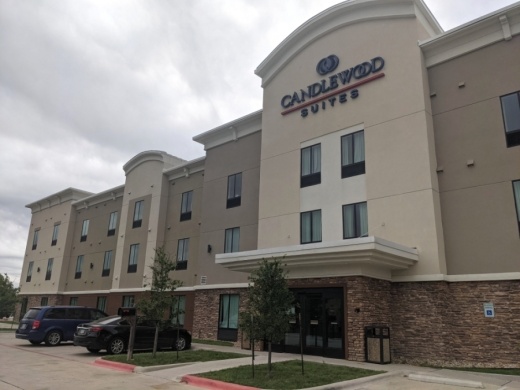Austin City Council on Aug. 11 voted 7-4 for the $9.55 million purchase the Candlewood Suites at 10811 Pecan Park Blvd., Bldg. 2, Austin, to provide "services, shelter, or housing" units per the approved city resolution. Council members Mackenzie Kelly, Alison Alter, Ann Kitchen and Leslie Pool voted against buying the 83-room hotel. Building renovations are expected to run the city an additional $1.66 million.
The vote came one day after Williamson County commissioners once again threatened legal action if the city's purchase plans moved forward. Williamson County Precinct 2 Commissioner Cynthia Long also petitioned Austin officials to hold off on going down the "flawed path" of the hotel purchase in a pair of letters sent to the city this week.
“Mayor [Steve Adler], you can do things under the cover of darkness, but you will not trample upon the people of Williamson County,” County Judge Bill Gravell said Aug. 10.
Kelly, who represents Austin City Council District 6, has opposed the purchase and the hotel's use for homeless housing since the spring. Kelly also expressed her view that Austin has not acted on a resolution she sponsored this spring directing Austin to cooperate with neighboring counties on homeless strategy; while that measure set a July 29 deadline for a progress report on staff's work, Homeless Strategy Officer Dianna Grey said July 28 that an update would not be coming until late August.
“I remain concerned that we have not adequately addressed the concerns of the residents or engaged our Williamson County partners. ... Moving forward without consensus puts us at greater risk of litigation—an irresponsible and avoidable use of city resources," Kelly said.
Ahead of council's vote on the item, Adler said he has been in communication with Gravell and other Williamson County officials, and that their feedback could inform work at the housing facility once it opens.
“I want the commissioner in Williamson County, the judge in Williamson County to know that I have also heard them. I’ve had the opportunity to speak with them on numerous occasions about this. I understand the concerns that they are raising, and I think that provides us exactly what it is that we need to do as we move forward," Adler said.
Other council members also said they felt communications with Williamson County have been lacking, and that the site is not the best location available for Austin's homeless hotel strategy to expand.
“I don’t believe this location is the best location. I've been up to see it, I think there are issues with it. But beyond that, we pledged to work with Williamson County," Kitchen said. "Moving forward with what is not the best option is not appropriate for us to do today and I’m disappointed that we’re doing that."
Resident reactions
Council's vote came hours after several residents speaking at the Aug. 11 meeting voiced opposition to the purchase for a range of reasons including Austin's communications with Williamson county officials and residents, available resources near the hotel and public safety.
“There is no public bus, there is no local grocery and there is no physical and mental health facilities in the immediate area. And along with other neighbors, we have experienced drug paraphernalia in the yards against the fence line along the Candlewood Suites area," said Mike McShea.
Many public comments centered on the perceived lack of collaboration between Austin and Williamson County.
“From the beginning, you blindsided us by failing to notify us and [Williamson County] about the purchase. You did it again by obscurely removing all [permanent supportive housing] terminology from this item. [The SAFE Alliance] ... urged council not to buy it since it is in Williamson County and doesn’t afford the same protections as Travis County," said Bianca Ramirez. "Many of you claim to be against systemic oppression of disenfranchised communities who are building up the middle class, yet the city places these housing units in those same exact places with dense minority populations who are struggling. Why are you willing to haphazardly create an environment that makes it difficult for future generations to navigate or maintain a livelihood?"
Rupal Chaudhari, an organizer of the Stop Candlewood group opposed to the hotel purchase, also called out her view of a "broken" chain of information between Austin and the Candlewood-area community.
"After so much controversy, it should be easy to communicate with us. ... Communication is broken at Austin City Hall. No one from [the] city has reached out to us regarding Item 13," she said. "It was wrong for Austin eight months ago and it is still wrong today regardless of whatever coat of paint you try to slap on it.”
While a majority were against the city's Candlewood process, not all speakers at the Aug. 11 session voiced resistance. João Paolo Connolly, organizing director for the Austin Justice Coalition, said the reaction to the purchase represented deeper sentiments tied to local affordable housing and the makeup of the local homeless population.
“The kind of opposition that we are seeing to this is not unlike the opposition we have to any fair housing issue in the city or anywhere in America. It’s also an opposition that we see to the application of Americans with Disabilities Act. We know that 69% of Austin's homeless population lives with a disability, we know that almost 40% of Austin’s homeless population is Black, so it’s hard to separate this issue from a fair housing issue. There’s no reason why some districts in the city should have shelter and housing space for the homeless while other districts can sort of throw a fit and turn it down. That’s not how we should move forward.”





